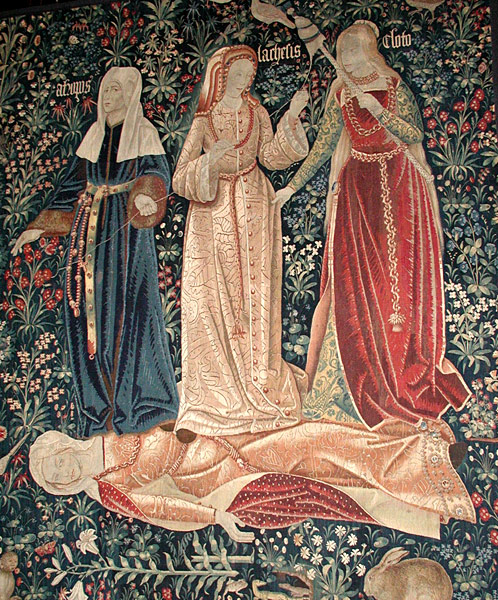|
Word Gems exploring self-realization, sacred personhood, and full humanity
Editor's 1-Minute Essay: Destiny
I am your density, Lorraine Back To The Future (1985)
As Churchill used the phrase, "Some blessings are disguised - very well disguised."
coming to terms Let's begin our discussion with some definitions.
This becomes clear as we survey what people say about the great idea of Destiny. Have a look at the many quotations on the “destiny main-page.” Notice the wide-ranging views. Some people talk as if they just stepped out of the Middle Ages or ancient Greece, asserting predeterminism as sacred gospel. These long-ago dogmas are refurbished with modern lingo, new wrappers, but it’s all the same old fatalism – to one degree or another, according to them, we’re all just puppets of the gods or unseen forces: “It's no use crying over spilt milk, because all of the forces of the universe were bent on spilling it.” "it is what it is" “A man does not make his destiny: he accepts it or denies it.” “Our souls are but leaves in a storm, and only the gods know where we will come to rest.” Some go to the other extreme, this time, elevating human choice, fortitude, as primary factors in a "man is the measure of all things" quest for ultimate destination: “Character is destiny.” “Your will shall decide your destiny.” "Destiny, coincidence, whatever you name it, inevitably lies in our hands.” destiny as dystopia And then there's the purely materialistic, and often militant, view which offers a new take on fatalism. In this case, the resignation is not based upon a dispiriting notion that the gods control too much but, instead, there are no gods, anywhere. There is no design or purpose to the universe, we’re all just flotsam floating on a cosmic sea of meaninglessness. For this group, Destiny becomes a rather discomfiting prospect: “The ancient covenant is in pieces; man knows at last that he is alone in the universe's unfeeling immensity, out of which he emerged only by chance. His destiny is nowhere spelled out, nor is his duty.” “That Man is the product of causes which had no prevision of the end they were achieving; that his origin, his growth, his hopes and fears, his loves and his beliefs, are but the outcome of accidental collocations of atoms; that no fire, no heroism, no intensity of thought and feeling, can preserve an individual life beyond the grave; that all the labours of the ages, all the devotion, all the inspiration, all the noonday brightness of human genius, are destined to extinction in the vast death of the solar system, and that the whole temple of Man’s achievement must inevitably be buried beneath the débris of a universe in ruins—all these things, if not quite beyond dispute, are yet so nearly certain, that no philosophy which rejects them can hope to stand. Only within the scaffolding of these truths, only on the firm foundation of unyielding despair, can the soul’s habitation henceforth be safely built.” The “Evolution” article presents many similar examples of materialistic thought leading to a destiny of existential crisis and, finally, dark extinction.
This group will tell you that, in order to discover meaning, purpose, and destiny, one must "go within" to consult with one’s own soul:
do you believe in the magic of a young girl’s heart
the great songwriter and singer, the legendary John Sebastian
John Sebastian was interviewed in his home. The discussion inevitably turned to the old classics -- and how I remember them with fondness. What a time for music it was, the latter 1960s. In those days, the very air we breathed seemed to be supercharged with a scintillating creativity. It was just hit after hit after great hit. It was incredible. The interviewer spoke of John’s memorable “Do You Believe In Magic?” What a great song, I always liked it. Well, I was really enjoying listening to John sharing his thoughts. But then I was treated to something even more special. My all-time favorite song by John is one that isn’t mentioned enough, and I wondered if they’d talk about it. I hit pay-dirt when the interviewer said, something like, “My favorite song of yours is ‘Darling Be Home Soon.’ Could you say something about it?” And when he said that, I thought, wow, this is amazing. Of the many songs that John wrote, the interviewer chose my favorite, too. But then I thought, maybe there’s a reason why “Darling Be Home Soon” rises to the fore and struck a chord with the interviewer.
But the surprises were not over for me. the time I spent confused was the time I spent without you John explained that the lyrics of “Darling Be Home Soon” reflected a certain relationship he was in at the time. The song is about a girl he loved who wasn’t seeing things clearly, he was trying to wake her up. This admission by John was extremely interesting to me. When I wrote “The Wedding Song” Kairissi and Elenchus discussed the meaning of “Darling Be Home Soon.” They speculated that John was using his art-form to reach out to his confused, out-of-phase lover. And here in this interview John intimates that this indeed is what was happening. My instincts were correct. Further, I don’t think you can even write a song like “Darling Be Home Soon” without having at least glimpsed what true love is like – the "great relief" is so far removed from the mere roll-in-the-hay definition. He didn’t want to give her up and was trying to bring her to a better frame of mind. When John Sebastian wishes and pleads for her to “be home soon,” we know that he was thinking of more than her poetry-in-motion gracefulness walking through the door at 6 o’clock. one more definition of Destiny We said that one’s definition of Destiny will reveal an underlying philosophical paradigm of life. And so it is. But how shall we arrive at a better view of Destiny? The ancient Spirit Guides, on the other side for thousands of years, offer their perspective on how true love and marriage work. And though some might think that this advanced guru-ism, information straight from them, should be the final word on the subject of framing a definition of Destiny, the best way to get at a good definition here, so that you own it and it's part of you, is to do what Rilke admonished: we have to “go within,” we have to “dig deep.”
As you might know, on the Word Gems site there are four books, many articles, thousands of pages, discussing the nature, meaning, and future of authentic romantic love. I must refer you to some of that as we cannot replicate that corpus here. But allow me to state in brief comment: Authentic romantic love speaks to our destiny because we were “made in the image” - and there is something in us that wants to reify that image. The ancient Spirit Guides refer to God as “Mother-Father God.” This does not mean that there are two beings with male-female bodies somewhere on high; in fact, we do not, and may never, know exactly what it means; however, in some sense, the essence of Divinity expresses itself in terms of male-female energy. And it is our destiny to emulate the Divine Parent(s) by entering the true eternal marriage with a sacred Twin Soul. Much more could be said on this subject. For example, life is not regulated by the fixed and prearranged; instead, reality is governed by quantum fields of probability. The three Fates had it exactly wrong. George Alexiou really nailed it with, "The only thing about you that was meant to be is you" - yes, with the only question remaining, will we develop ourselves? as no one will force us. Our potential is unlimited, having no discernable ceiling. That said, human freedom of choice is not absolute. As Kairissi and Elenchus discussed in "Prometheus," we enjoy purview of expression only within, and not beyond, the parameters for which we were created: just as the acorn has no freedom to become an eagle but only a towering oak, so too our freedom is directed toward our "made in the image" capacities. Other questions raised in this writing are discussed elsewhere on the Word Gems site.
George was no dummy; a closet intellectual, but without social graces, his warp-drive wouldn't be installed until Tuesday. Though unflashy and bumbling that day in the shake-shop, he was onto something important. Lorraine felt it, too. To link romantic love with something exclusive and enduring, even eternal, to merge it with the concept of Destiny, represents a very high order of spiritual advancement. After all, the beasts of the field have no further plans for each other, dismiss each other as disposable, after the five seconds of bio-thrill; for them, there is no "great relief of having you," and only you, "to talk to."
|
|||||||
|
|



